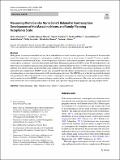Measuring Men’s Gender Norm Beliefs Related to Contraception: Development of the Masculine Norms and Family Planning Acceptance Scale
Publication Date
2021Author
Sara J. Newmann, Jennifer Monroe Zakaras, Shari L. Dworkin, Mellissa Withers, Louisa Ndunyu, Serah Gitome, Phillip Gorrindo, Elizabeth A. Bukusi & Corinne H. Rocca
Metadata
Show full item recordAbstract/
Male partner resistance is identified as a key factor that influences women’s contraceptive use. Examination of the masculine norms that shape men’s resistance to contraception—and how to intervene on these norms—is needed. To assess a gender-transformative intervention in Kenya, we developed and evaluated a masculinity-informed instrument to measure men’s contraceptive acceptance—the Masculine Norms and Family Planning Acceptance (MNFPA) scale. We developed draft scale items based on qualitative research and administered them to partnered Kenyan men (n = 150). Item response theory-based methods were used to reduce and psychometrically evaluate final scale items. The MNFPA scale had a Cronbach’s α of 0.68 and loaded onto a single factor. MNFPA scores were associated with self-efficacy and intention to accept a female partner’s use of contraception; scores were not associated with current contraceptive use. The MNFPA scale is the first rigorously developed and psychometrically evaluated tool to assess men’s contraceptive acceptance as a function of male gender norms. Future work is needed to test the MNFPA measure in larger samples and across different contexts. The scale can be used to evaluate interventions that seek to shift gender norms to increase men’s positive engagement in pregnancy spacing and prevention.

